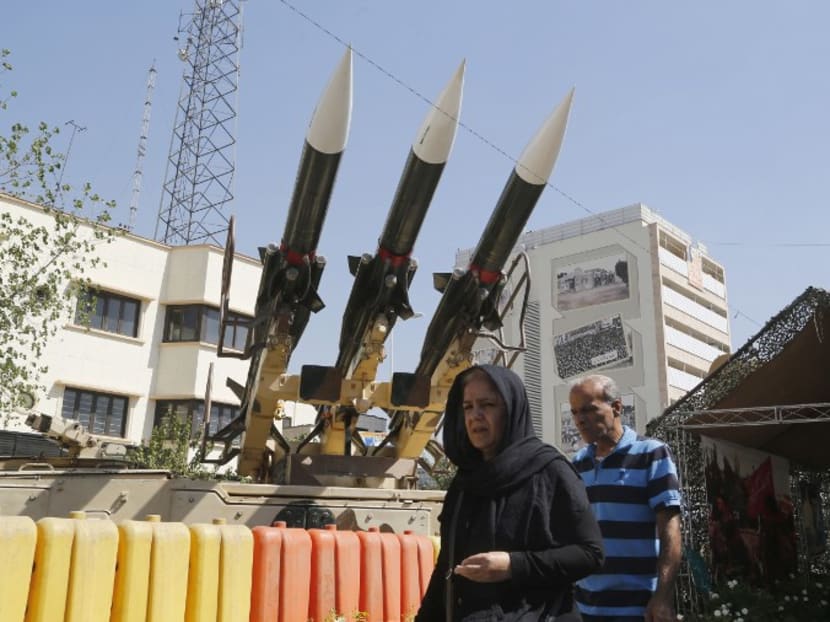Iran readies retaliation after Trump imposes fresh sanctions
TEHRAN — The US imposed fresh sanctions on Iran as US President Donald Trump sought to punish Tehran for its ballistic missile program, prompting a warning from the Islamic Republic that it will respond in kind and the announcement of further tests.

Iranians walk past Sam-6 missiles displayed in the street during a war exhibition to commemorate the 1980-88 Iran-Iraq war at Baharestan square, south of Tehran on September 26, 2016. Photo: AFP
TEHRAN — The US imposed fresh sanctions on Iran as US President Donald Trump sought to punish Tehran for its ballistic missile program, prompting a warning from the Islamic Republic that it will respond in kind and the announcement of further tests.
The Treasury Department published a list on Friday (Feb 3) of 13 individuals and 12 entities facing new restrictions for supporting the missile program, having links to terrorism or providing support for Iran’s hard-line Islamic Revolutionary Guard Corps. The entities include companies based in Tehran, the United Arab Emirates, Lebanon and China.
In response, Iran “will take action against a number of American individuals and companies that have played a role in generating and supporting extremist terrorist groups in the region or have helped in the killing and suppression of defenceless people in the region,” the Foreign Ministry said in a statement published by the state-run Islamic Republic News Agency. It said the targets of its sanctions will be named later.
The semi-official Tasnim news agency reported on Saturday that the Islamic Revolutionary Guards Corp started military exercises, including the testing of missile and radar systems. Three different missiles could be test-fired on Saturday, it reported, without saying where it got the information.
The Trump administration has sought to take a harder line on Iran, banning its citizens from entering the US and accusing the nation of interfering in the affairs of US allies in the Middle East. But the US sanctions announced on Friday were limited in scope, serving mostly as a warning signal.
‘PREVIOUS ACTION’
“These are not major players,” Mr Sam Cutler, a sanctions lawyer at Horizon Client Access in Washington, said of those on the list. “It seems to be a follow-up on a previous action that the Obama administration took in terms of identifying people in existing networks that had been previously sanctioned. I see this as consistent with prior policy rather than anything new, the rhetoric notwithstanding.”
The sanctions wouldn’t affect a deal signed between Boeing and Iran’s national carrier in December, according to a Trump administration official who briefed reporters on condition of anonymity. The agreement to sell 80 planes is valued at US$16.6 billion (S$23.4 billion) and is the first of its kind since 1979.
“This action reflects the United States’ commitment to enforcing sanctions on Iran with respect to its ballistic missile programme and destabilising activities in the region,” the Treasury Department said in its statement. It called the actions “fully consistent” with a nuclear accord Iran reached with the US and five other world powers.
PLEASED LAWMAKERS
While Mr Trump’s decision to take action against Iran early in his administration pleased US lawmakers in both parties who were never comfortable with President Barack Obama’s tentative rapprochement with Iran, it could unsettle domestic Iranian politics as President Hassan Rouhani seeks re-election in May.
“With the increase in sanctions, the perception that the US might be rolling back on the Iran deal – and the anti-Iran mood that is emerging in Washington – will further empower hardliners in Iran, where the rhetoric will be, ‘we told you so – these people cannot be trusted,” said Mr Maha Yahya, director of the Carnegie Middle East Centre.
A second administration official said the sanctions were pulled together after extensive consultation between various government agencies and the National Security council. The official said the U.S. wants to work with Iran when it abides by its international commitments, but will continue to pressure Iran to change its behaviour.
"Iran is playing with fire – they don’t appreciate how ‘kind’ President Obama was to them. Not me!," Mr Trump tweeted early Friday. BLOOMBERG






